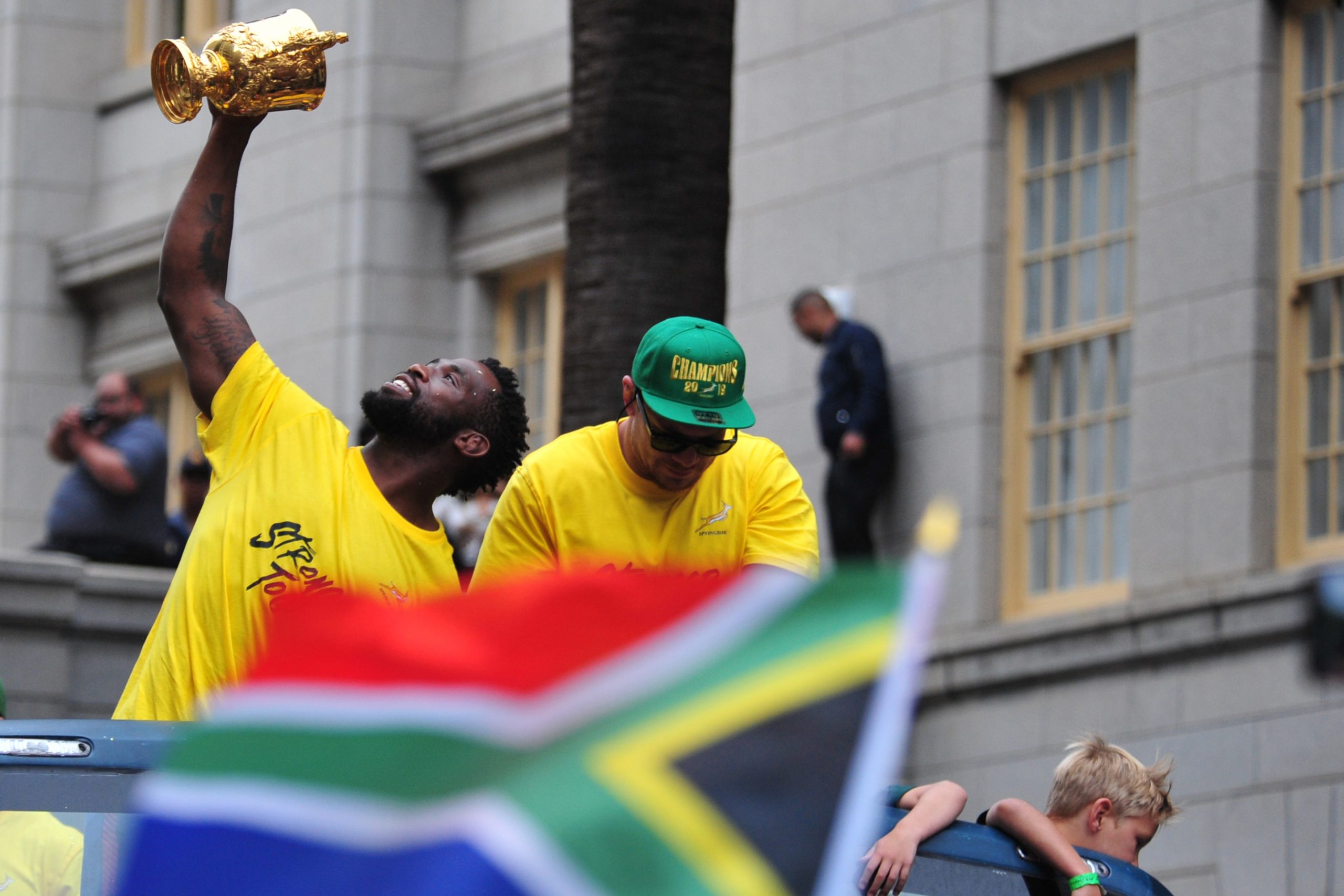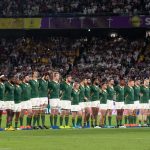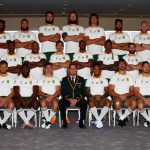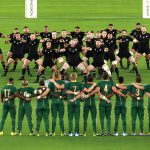The dangers of sporting euphoria
The Springboks’ Rugby World Cup triumph gave South Africans an insane high as they celebrated a landmark victory led by the team’s first black captain. But this high has intense side-effects.
Author:
27 November 2019

If South Africa was a person today, it would be Lebo Mogoma, a schoolboy from Helpmekaar College in Parktown, Johannesburg.
His bright and hopeful eyes flashed across our screens and around the world in early November. Mogoma’s eyes turned red and gave way to tears when his hero, Springbok captain Siya Kolisi, signed his boots from the open-top bus.
Mogoma’s 15-year-old heart and mind were overwhelmed, unable to comprehend what he was feeling inside. He wiped away his tears with his brown school blazer and pressed his palms together as a sign of thanks to Kolisi for his kind gesture.
The moment seemed to mean so much more than just a boy interacting with his hero and as a result of the video going viral, it has come to represent South Africa’s moment of hope. Mogoma was all South Africans in that time – awestruck, emotional and dreaming.
The Springboks’ parade through the paved streets of Johannesburg and the scruffy township roads of the Eastern Cape represented a moment when hope, for once, overshadowed our politics of despair and betrayal. For once, we at least had a semblance of unity, made possible by the spirit of the Springboks on their road to victory in Japan.
Springbokism in full effect
South Africa’s citizens from the ganglands of the Cape Flats and the easy streets of Joburg’s northern suburbs gravitated towards Kolisi’s world-conquering men as they awakened the dormant spirit of 1995 and reinvigorated the African dream born in 2007, when then captain John Smit and former president Thabo Mbeki lifted the Webb Ellis Cup. Less than two years later, Mbeki exited the Union Buildings. He was still an African, but he was unemployed like millions of others and the dream was turning into a nightmare.
Related article:
Mogoma’s moment came full circle when Kolisi and his wife, Rachel, invited him to the Players Choice Awards. On that night, his heart no doubt still pounding in his chest, Mogoma stood side by side with his idol and about 20 other Springboks. What was once just a dream of a black kid being educated in Joburg’s first Afrikaans school, had become a reality within days. But these are the days when fairy tales are offset by fallacies, neither of which are wholesome ingredients for South Africa’s development and progress. The current wave of “Springbokism” is greeted with cynicism in some quarters by those who lament the fact that 1995 and indeed 2007 changed little in South African society.
Researcher, author and lecturer Dale McKinley, who delivered a damning indictment of the Fifa 2010 World Cup at a recent Sport and the Struggles for Social Justice conference, says these are dangerous times, when the euphoria of the moment blinds South Africans to the daily injustices that take place unabated.
“The characteristics of the soccer World Cup are classic attributes of the Olympics, as it has been throughout its history, and classic examples of most mega events. And it’s in the context of pursuing mega events and mega projects that our country is in a worse economic situation than it’s ever been – not simply because of the politics of betrayal and the politics of corruption, but the politics of mega projects like [power stations] Kusile and Medupi,” McKinley said.
After footing the bill of about R38 billion to host the 2010 Fifa World Cup, ordinary South Africans were locked out of the system, unable to reap the benefits of giving up freedom of movement and their entrepreneurial spirit within stadium districts.
“Ask the informal traders in South Africa who were completely banned from a 2km radius around every World Cup venue. Local entrepreneurs who were supposed to benefit were replaced by Coca-Cola and Budweiser and corporate capital had the monopoly. That’s the branding of the Olympics, that’s branding of the World Cup. It’s corporate power, and the complete delegitimisation of local entrepreneurship developmental processes,” said McKinley, the author of South Africa’s Corporatised Liberation and The ANC and the Liberation Struggle.
“So, nationalism and patriotism become a cover and displacer. Forget about all your problems. You’ll forget the fact that you now have a bunch of white elephants. You’ll forget the fact that Mbombela Stadium and Peter Mokaba Stadium have never been full except when Kaizer Chiefs or Orlando Pirates play [there]. The Cape Town Stadium costs massive amounts of money. South Korea destroyed four of their stadiums after the World Cup because it was cheaper to destroy them than to maintain them. These are the realities that are not talked about.”
South Africa’s love for a party
That South Africans love a sense of occasion, pomp and theatre is glaringly obvious given the events of the past few weeks. They love a good party. They live to celebrate victory on the global stage, a big sporting moment, like winning a third Rugby World Cup, hosting the 2010 World Cup and scoring 438 runs in 50 overs of cricket. Yet by and large, these seismic events have barely made an impact on the South African landscape, or left a blueprint to greatness. South African cricket is on a downward spiral after another disastrous World Cup campaign.
For the most part, major sporting events have enriched the few at the expense of the many, and even before the confetti hit the soil from which South Africa’s Rugby World Cup heroes were born, questions have been asked: What is the point of all this when the lives of ordinary South Africans remain unaffected? What has changed in South African sport? More importantly, what has changed in Zwide, Mdantsane and Langa?
Related article:
“Right from the very beginning of this transition, we’ve accepted the talk about ‘miracle reconciliation’ and all sorts of things. The fact of the matter is that the ruling party basically went over the heads of the people, cut a deal, a completely anti-democratic deal, which basically said, ‘You get political freedom, you leave the economy alone,’” added McKinley.
While rugby development in townships has improved with isolated programmes, it is nowhere near capable of producing more Kolisis without the intervention of established rugby schools in the traditional mould.
It’s difficult to imagine, with all the World Cup fervour wafting in the air, that little will change in communities like the one that reared Kolisi. It’s impossible to say with any certainty that young Mogoma will have a hurdle-free rugby journey. He’s in a suburban school, so already he’s better off than millions of others.
Zwide, near Port Elizabeth, home to Kolisi, falls within Ward 28 and has an employment rate of 28% and an average annual household income of just R30 000. Only 37% of its residents have completed matric, according to the most recent census. Nearby Ward 27 is named Soweto on Sea, an area riddled with crime and poverty.
Reality quickly hits
Just days after the Bok’s victory parade, credit ratings agency Moody’s downgraded South Africa’s outlook from stable to negative, slashing the country’s economic outlook by 0.5% to 1%. Cyril Ramaphosa’s entire presidency appears to hang on whether or not he can turn the economy around as the unemployment rate climbs sharply.
First democratic president Nelson Mandela had hoped that sport would begin to breathe development and upliftment into areas like Zwide and Mdantsane. In theory, World Cup victories are meant to inspire sportsmen and women and leaders to bring about change for good.
On the opening day of the 2010 Fifa World Cup, while most South Africans rallied behind Bafana Bafana as they prepared to face Mexico at FNB Stadium on 9 June, a little-known protest was taking place just a few kilometres away. “Did anyone see anything about the march that took place? Of course you didn’t. Because the organisers put a 5km exclusion zone in place around the stadium and massive numbers of riot police. We had applied months in advance for a permit to march,” said McKinley.
Related article:
“We wanted the world to see. We were put in Soweto 6km away, and told to march around the streets of Dobsonville and Diepkloof. So resistance there was simply not covered, and it’s never mentioned in the academic literature. It’s been erased and whitewashed from history, much like the other resistances. It’s not just the apartheid era, it’s the post-apartheid era that has done much of the same things.
“Instead of development in sport being treated as a necessary, basic need for public good, active participation has become moulded and determined by the servicing of personal and elite interests. Sports has been turned upside down from what it’s supposed to be. It’s become a highly commoditised, highly profit-driven and serves particular class interests, much like politics … So instead of a right to recreation, instead of a right to sports, we have privileges.”



